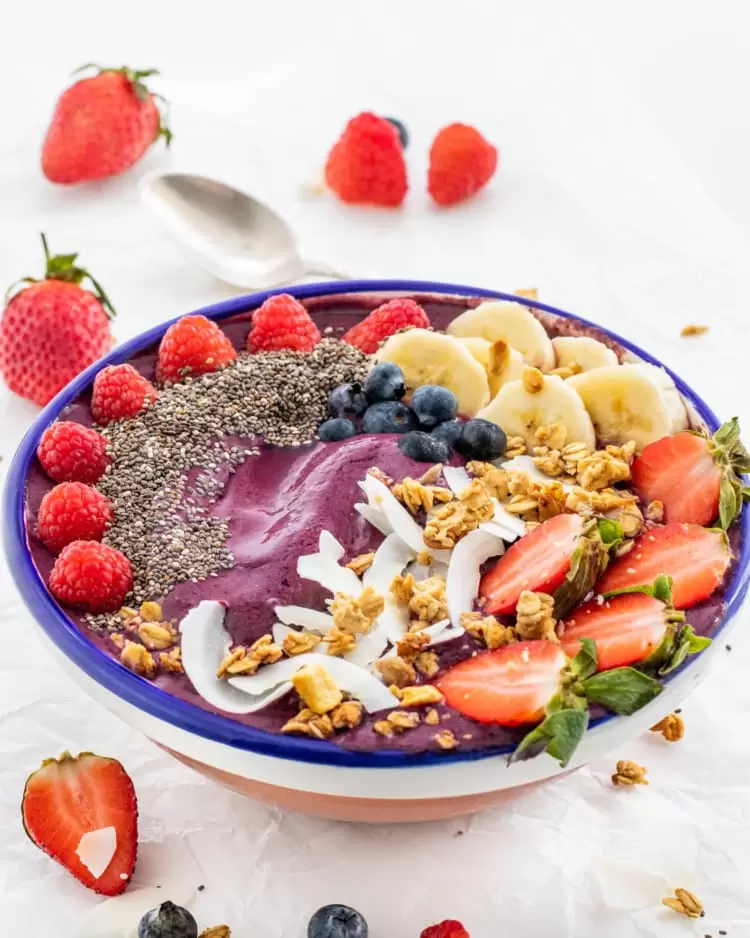Is frozen fruit healthy? That’s a question many health-conscious consumers ask when looking for affordable and convenient ways to include more fruits in their diet. As fresh produce prices fluctuate and availability changes with the seasons, frozen fruit has become a popular alternative in supermarkets around the world. But does frozen fruit truly retain its nutritional value, or does the freezing process compromise the vitamins and minerals our bodies need?
Frozen fruit is typically harvested at peak ripeness — the moment when its flavor, texture, and nutrient content are at their best. Immediately after harvesting, the fruit undergoes a process known as flash freezing, where it is rapidly cooled to very low temperatures to lock in freshness and prevent spoilage. This method not only extends the shelf life of the fruit but also helps preserve many of its original nutrients.
Many people assume that fresh fruit is always the healthier option. While fresh produce from local sources can be incredibly nutritious, it often travels long distances before reaching store shelves. During transportation and storage, certain nutrients — especially water-soluble vitamins like vitamin C — begin to degrade. By contrast, properly frozen fruit can maintain a consistent level of nutritional quality from the time it was picked to the moment it’s consumed.
Frozen fruit also offers a level of convenience that makes healthy eating more accessible. There’s no need to wash, peel, or chop — it’s ready to use in smoothies, oatmeal, yogurt, and baked goods. Additionally, it significantly reduces food waste. With fresh fruit, spoilage is common if it isn’t consumed quickly. Frozen options allow you to store fruit for months without compromising safety or flavor.

Still, not all frozen fruit is created equal. Some packaged varieties may contain added sugars, syrups, or preservatives. It’s important to read labels carefully and choose products labeled “100% fruit” or “no added sugar.” When selected properly, frozen fruit can be just as — or even more — nutritious than fresh alternatives, especially outside of the typical harvest season.
So, is frozen fruit healthy? In most cases, yes. It offers a practical, budget-friendly, and nutritious way to enjoy your favorite fruits year-round. In this article, we’ll explore how frozen fruit is processed, what nutrients it retains, its health benefits, potential downsides, and the best ways to use it in your daily meals. Whether you’re trying to simplify your diet, reduce waste, or just make healthier choices, frozen fruit might be one of the smartest additions to your kitchen.
How Is Frozen Fruit Processed?
Frozen fruit typically begins its journey at the farm, where it is harvested at peak ripeness. This is crucial because fruits picked at full maturity contain higher levels of vitamins, antioxidants, and flavor compounds. Once picked, the fruit is washed, sorted, and quickly frozen through a method called flash freezing. This involves lowering the temperature of the fruit to below -18°C in a short amount of time, which prevents ice crystals from damaging the cellular structure of the fruit.

The goal of this rapid freezing is to lock in nutrients, preserve taste, and extend shelf life without the need for added preservatives. Compared to slow freezing, flash freezing results in a better texture and higher nutrient retention when the fruit is eventually thawed and consumed.
Does Frozen Fruit Retain Its Nutritional Value?
A common concern people have when asking, is frozen fruit healthy, is whether nutrients are lost during the freezing process. Studies show that the majority of vitamins and minerals are preserved in frozen fruit. In fact, frozen fruit may contain more nutrients than fresh fruit that has been stored for several days or weeks before being eaten.
- Vitamin C: Although sensitive to light and air, vitamin C levels in frozen strawberries and blueberries often remain higher than in fresh ones after several days of storage.
- Antioxidants: Polyphenols and flavonoids in berries are well preserved during freezing.
- Fiber: The fiber content remains stable, making frozen fruit a good source for digestive health.
Benefits of Eating Frozen Fruit
- Year-round availability: Enjoy tropical and seasonal fruits any time of the year without depending on local harvests.
- Reduced waste: Frozen fruit doesn’t spoil as quickly as fresh fruit, helping you save money and reduce food waste.
- Convenience: Pre-cut, washed, and ready to use — ideal for smoothies, snacks, and baking.
- Affordability: Frozen fruit is often cheaper than fresh, especially for off-season varieties.
- Consistent quality: Nutrients are preserved at the time of freezing, ensuring reliable nutrition.
Are There Any Downsides?
While the answer to “is frozen fruit healthy?” is mostly yes, it’s still important to be aware of certain drawbacks. Not all frozen fruit products are created equal, and some may contain less-than-ideal ingredients.
- Added sugars: Some frozen fruit is packaged with syrup or sweeteners. These additives can increase calorie content and diminish health benefits.
- Texture changes: Once thawed, fruits like peaches or mangos may become softer or mushier than their fresh counterparts. This doesn’t affect nutrition, but it may impact texture preferences in recipes like fruit salads.
- Limited options: Not all fruit types freeze well — watermelon, citrus, and apples may lose texture and flavor when frozen and thawed.
Best Ways to Use Frozen Fruit
Frozen fruit is incredibly versatile and works well in many dishes. To make the most of its benefits, try incorporating it into recipes that don’t require a firm texture or where the fruit is blended or cooked:
- Blend into smoothies or protein shakes for a refreshing, nutrient-rich drink.
- Add to hot oatmeal or overnight oats for a sweet, fiber-rich breakfast.
- Use in baking muffins, banana bread, or pancakes for a fruity twist.
- Simmer with a bit of water and honey to make homemade fruit compotes or sauces.

Fresh Fruit vs. Frozen Fruit: A Quick Comparison
| Factor | Fresh Fruit | Frozen Fruit |
|---|---|---|
| Availability | Seasonal | Year-round |
| Cost | Higher, especially off-season | Generally more affordable |
| Nutrient retention | Can decline during storage | Preserved through flash freezing |
| Shelf life | Short | Long (months) |
| Preparation | Requires washing, peeling | Pre-washed, pre-cut |
As this comparison shows, frozen fruit holds up well against fresh options — especially when convenience, cost, and storage life are taken into account. It provides an effective way to enjoy nutritious fruit with minimal effort.
Conclusion: So, Is Frozen Fruit Healthy?
Is frozen fruit healthy? Based on current scientific evidence and nutritional analysis, the answer is a confident yes — with a few caveats. When chosen wisely and consumed as part of a balanced diet, frozen fruit offers a convenient, nutritious, and cost-effective way to increase your fruit intake year-round.
One of the strongest advantages of frozen fruit is that it’s harvested at peak ripeness and flash-frozen shortly afterward. This process preserves much of the fruit’s vitamin content, antioxidant levels, and natural flavor. Unlike fresh fruit, which may spend days in transport and on store shelves, frozen fruit maintains its nutritional integrity from field to freezer. That means when you enjoy a handful of frozen berries in your smoothie, you’re likely getting the same — or even higher — levels of key nutrients compared to their “fresh” counterparts.

Frozen fruit also plays a valuable role in reducing food waste and increasing dietary consistency. Since it can be stored for months without spoiling, you’re far less likely to throw it out. This makes frozen fruit an excellent choice for busy individuals, families, or anyone trying to eat more fruits without the pressure of finishing everything within a few days.
That said, not all frozen fruit products are equal. It’s essential to read labels and avoid brands that add sugars, syrups, or preservatives. Always choose plain, unsweetened fruit that lists only the fruit itself as an ingredient. Doing so ensures you’re getting the purest nutritional benefit without hidden calories or unwanted additives.
Additionally, while frozen fruit shines in smoothies, baking, and cooked dishes, it may not always be the best substitute for fresh fruit in recipes that rely on firm texture — such as fruit salads or garnishes. However, for most culinary uses, the difference is negligible or even unnoticeable, especially when blended or heated.
In an era where convenience often comes at the cost of nutrition, frozen fruit is a rare exception. It bridges the gap between healthy eating and modern lifestyles, providing a solution that’s accessible, practical, and nutritionally sound. Whether you’re trying to cut down on food waste, save money on groceries, or simply eat better, frozen fruit is a smart, health-conscious addition to your kitchen.
So, the next time you wonder, is frozen fruit healthy? — remember that it’s not only healthy but often just as beneficial as fresh produce. With the right choices and a little creativity in the kitchen, frozen fruit can support your wellness goals without compromise.
External Source: Healthline – Is Frozen Fruit Healthy?


